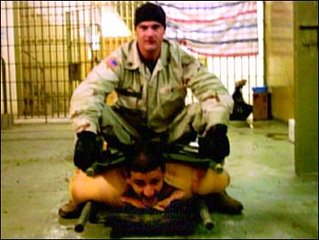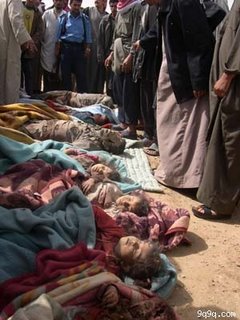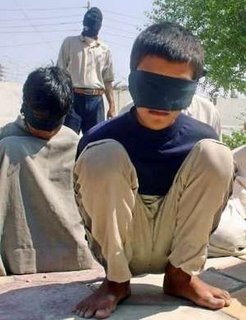"the iraqi people owe the american people a huge debt of gratitude"
 "grateful" dog eating body--falujah
"grateful" dog eating body--falujah  Us GI torturing "grateful" iraqi prisoner
Us GI torturing "grateful" iraqi prisoner "grateful" parent-dead "terrorists"--Us raid--iraq
"grateful" parent-dead "terrorists"--Us raid--iraq "grateful" depleted uranium baby --iraq
"grateful" depleted uranium baby --iraq
"I am proud of the efforts we did. We liberated that country from a tyrant. I think the Iraqi people owe the American people a huge debt of gratitude, and I believe most Iraqis express that. I mean, the people understand that we’ve endured great sacrifice to help them. That’s the problem here in America. They wonder whether or not there is a gratitude level that’s significant enough in Iraq. "--george w. bush on 60 minutes
 more "grateful" iraqis and dead "terrorists"
more "grateful" iraqis and dead "terrorists" destroyed home --"grateful" iraqis
destroyed home --"grateful" iraqisBaghdad morgue took 16,000 bodies in 2006
Reuters
 "grateful" iraqis --baghdad morgue
"grateful" iraqis --baghdad morgue Sunday, January 14, 2007; 10:04 AM
BAGHDAD (Reuters) - The Baghdad morgue took in about 16,000 unidentified bodies last year, the bulk of them victims of death squads and other sectarian violence, a source at the morgue told Reuters on Sunday.
About 1,350 bodies were received in December, the source said, speaking on condition of anonymity because the Iraqi government has banned officials from releasing data on casualty rates. As throughout the year, between 80 and 85 percent of these were victims of violence.
The morgue data -- for Baghdad only -- suggest that a figure of 12,320 civilian deaths in "terrorist violence" in 2006, given two weeks ago by Interior Ministry sources, does not include all the victims of the bloodletting in Iraq. The Interior Ministry statistics exclude violent deaths classed as "criminal."
Since the morgue statistics also do not take account of the many deaths outside Baghdad, nor indeed of all violent deaths in the capital, the total death toll is certainly higher.
A Health Ministry official told the Washington Post last week that nearly 23,000 civilians and police were killed in the year, according to Health Ministry data. A deputy minister said he could not confirm the figures.
The Interior Ministry said 1,231 policemen were killed.
The United Nations has added Health Ministry data for the country as a whole to Baghdad morgue figures to come up with figures showing 3,700 civilians were killed in October alone -- or about 120 people a day.
The Iraqi government has called that an exaggeration but given no comparable official figures of its own. No U.N. data are yet available for the period since October.
While the total death toll remains disputed, no officials challenge the indications given by various sets of data that killings have increased markedly in the past year, notably since the destruction of a major Shi'ite shrine in February.
The Interior Ministry figures showed three and a half times more civilian deaths in December than in January.
No data were available for November, but in October the morgue took in about 1,600 bodies, down from a peak of 1,815 in July.
© 2007 Reuters
Disease alert after sewage system collapses
Report, IRIN, 15 January 2007

A street in Baghdad flooded with sewage water. (IRIN)
BAGHDAD -- Residents of Iraq's capital, Baghdad, are at risk of contracting a range of waterborne diseases as the city's sewage system has collapsed after four days of heavy rain, the country's health ministry said on Monday.
For nearly a week now, 45-year-old teacher Jassim Abdullah has been forced to buy bottled water for his family's daily use at an expense that his meagre income barely covers.
"We can't use tap water for drinking or cooking. It's all sewage. That is why I have put aside 100,000 Iraqi dinars [about US $75] to buy water for cooking and washing," said Abdullah, a father of five girls, from Baghdad's poor neighbourhood of Hurriyah.
Dr Abdul-Rahman Adil Ali of the Baghdad Health Directorate warned of the dire consequences of a non-operational sewage system.
"As the sewage system has collapsed, all residents are threatened with gastroenteritis, typhoid fever, cholera, diarrhoea and hepatitis. In some of Baghdad's poor neighbourhoods, people drink water which is mixed with sewage," Ali said.
Iraq's Young Blood
Iraq's Lost Children
Christian Caryl, Newsweek

A 2006 study by Iraqi psychiatrists, sponsored in part by the World Health Organization, found that 30 percent of the 1,090 children surveyed at schools in Mosul were suffering from posttraumatic stress disorder. In Baghdad, 47 percent of those surveyed reported "exposure to a major traumatic event," and 14 percent suffered from symptoms of PTSD. These can include anxiety, depression and nightmares—all of which are particularly damaging to young minds. "Some children wake up in the middle of the night and can't go back to sleep, [worried about] how they're going to school in the morning," says Nail Subhi, who works with an American aid group called Generation Iraq Organization. "Is there going to be someone in the street waiting to kill or kidnap them?" In a February 2006 study published by the Association of Psychologists of Iraq, 92 percent of the kids surveyed showed signs of learning impediments.
...Since September, millions of other kids have had to abandon their education for other reasons. Simply getting to class has become an unacceptable risk for many; schoolchildren in Baghdad can run into a half-dozen or more checkpoints—of the estimated 1,000 in the city—each morning. Lawyer Abu Mohammed Abid Tuayess is a father of three. "I deliver my daughter to school every day," he says. "I've seen kidnappings happen right in front of my eyes when I've been dropping her off." At the beginning of this academic year, schools in two provinces were forced to close by sectarian violence. Hundreds of teachers have been killed, while school buildings have been hit by mortars or shredded by fire fights. Last March Fatima Abdul Melik, 11, was boarding her schoolbus in Baghdad when a dark brown car, filled with masked men, screeched to a halt before her. Then came the loud popping sounds of gunfire. The children, screaming, piled out the open door to confront the bloody corpse of Abu Ali, their once beloved bus driver. After that, Fatima says, she abandoned school for a time: "Even now I start shaking when I hear gunfire."
 "hundreds of teachers have been killed"
"hundreds of teachers have been killed"The Ministry of Education estimates that only 30 percent of the 3.5 million Iraqi elementary-age kids are attending school now, down from 75 percent last year. Given those conditions, "the current situation is crucial for education in 2006-07," says Husam Sabri, a leading UNICEF official in Iraq. While the vast majority of schools remain open and the government has instituted a relocation program for families who want to move their kids to safer areas, millions of children are receiving a sporadic education at best. Sabri worries that entire grades could end up being forced to repeat the year, possibly crippling an already overburdened school system. Um Firas, a supervisor at a Baghdad school, says that teachers are increasingly finding it impossible to teach under such conditions, while children are less inclined to learn. "I assure you that even the students who pass their grade have received not even half of the education they should," she says.
 GIs search--"grateful" iraqis
GIs search--"grateful" iraqis  "grateful" iraqi-waiting to express "gratitude"
"grateful" iraqi-waiting to express "gratitude" 

1 Comments:
This comment has been removed by a blog administrator.
Post a Comment
<< Home